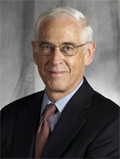John Mendelsohn (doctor)
John Mendelsohn (August 31, 1936 – January 7, 2019) was an influential American oncologist, researcher, and academic administrator known for his pioneering work in the field of cancer therapy. He served as the president of The University of Texas MD Anderson Cancer Center from 1996 to 2011, where he played a crucial role in advancing cancer research and treatment. Mendelsohn's research primarily focused on the development and application of monoclonal antibodies targeted against growth factors involved in cancer development, most notably the epidermal growth factor receptor (EGFR).
Early Life and Education[edit | edit source]
John Mendelsohn was born in Cincinnati, Ohio. He pursued his undergraduate studies at Harvard University, where he received his Bachelor's degree in Biochemical Sciences. He then attended Harvard Medical School, earning his M.D. in 1963. Following his graduation, Mendelsohn completed his residency in internal medicine at the Brigham and Women's Hospital in Boston, Massachusetts, and later, a fellowship in oncology at the National Cancer Institute (NCI).
Career[edit | edit source]
Mendelsohn's career was distinguished by his contributions to the understanding and treatment of cancer. Early in his career, he focused on the role of growth factors in cancer cell proliferation. His most significant contribution was the co-development of cetuximab (Erbitux), a monoclonal antibody that inhibits the epidermal growth factor receptor (EGFR), a protein found on the surface of many tumor cells. This work laid the foundation for the use of targeted therapies in cancer treatment.
During his tenure as president of MD Anderson, Mendelsohn emphasized personalized cancer therapy, where treatments are tailored to the genetic makeup of an individual's cancer. Under his leadership, MD Anderson consistently ranked as one of the top cancer hospitals in the United States.
Awards and Honors[edit | edit source]
Throughout his career, Mendelsohn received numerous awards and honors in recognition of his contributions to cancer research and medicine. These include the Lasker Award for Clinical Medical Research and the Karnofsky Memorial Award from the American Society of Clinical Oncology (ASCO).
Legacy[edit | edit source]
John Mendelsohn's legacy in the field of oncology is marked by his pioneering research in targeted cancer therapies and his leadership in cancer care and research. His work has significantly influenced the direction of cancer treatment, making a profound impact on the lives of cancer patients worldwide.
Death[edit | edit source]
John Mendelsohn passed away on January 7, 2019, after a battle with glioblastoma, a type of brain cancer. His death was widely mourned in the medical and scientific communities, where he was remembered as a visionary leader and a compassionate physician.
Navigation: Wellness - Encyclopedia - Health topics - Disease Index - Drugs - World Directory - Gray's Anatomy - Keto diet - Recipes
Search WikiMD
Ad.Tired of being Overweight? Try W8MD's physician weight loss program.
Semaglutide (Ozempic / Wegovy and Tirzepatide (Mounjaro / Zepbound) available.
Advertise on WikiMD
WikiMD is not a substitute for professional medical advice. See full disclaimer.
Credits:Most images are courtesy of Wikimedia commons, and templates Wikipedia, licensed under CC BY SA or similar.Contributors: Prab R. Tumpati, MD

